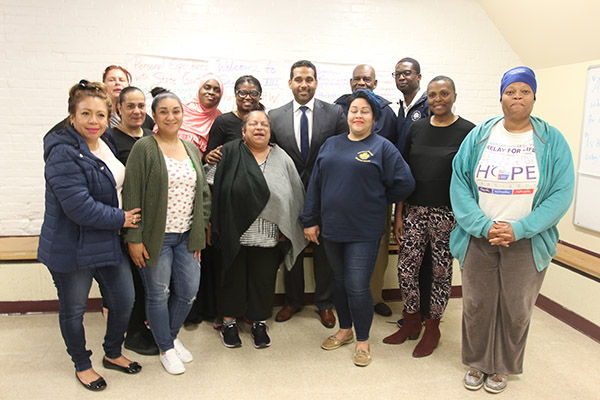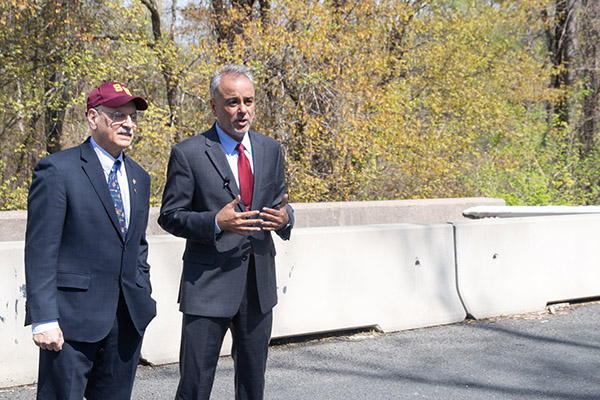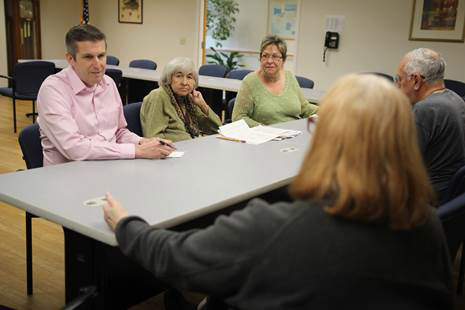Duff and Norwalk State Reps Highlight Education Funding for Norwalk in Democratic State Budget
Democrats Increase Norwalk Education Funding by $1.5 Million as Republican Budget Provides $0 in Education Funding for Norwalk
Norwalk, CT (May 6, 2019) – Today, on the steps of Norwalk City Hall, Senate Majority Leader Bob Duff (D-Norwalk), State Representative Lucy Dathan (D-Norwalk), State Representative Chris Perone (D-Norwalk), State Representative Travis Simms (D-Norwalk), and Norwalk Federation of Teachers President Mary Yordon highlighted the full state funding for local Norwalk education in the Democratic state budget passed last week in the Appropriations Committee.
In the 2017 bipartisan state budget a new, 10-year education funding formula for towns was enacted. Spearheaded by Senator Duff, the formula changed to provide more state education dollars to municipalities like Norwalk. Over the next two years Norwalk will receive an additional $1.5 million in state education funding.
In Fiscal Year 2019, Norwalk received $11,439,365 in state education funding. The Democratic state budget passed by Appropriations Committee will increase Norwalk’s state education funding by over $500,000 to $11,982,530 for Fiscal Year 2020. In Fiscal Year 2021, Norwalk will receive over $1 million more than Fiscal Year 2019 for a total of $12,525,694.
“The Democratic state budget is an honest line-by-line budget that will increase local education funding for Norwalk,” said Senator Duff. “By continuing the education promises we made the last two years in our bipartisan budget, we are providing our towns and boards of education the stability and funding they deserve. The $1.5 million increase in state education dollars for Norwalk means more teachers, stronger education programming, and a brighter future for our children. Thousands of people choose to raise their families in Norwalk because of our excellent education system. Today we repay that faith with a stronger investment in education.”
“I am delighted that under our Appropriations Committee budget we just passed, Norwalk is projected to get a fair share of our much needed education funding,” Rep. Dathan said. “It is encouraging to see everyone on the table prioritizing education funding as we should. Providing the necessary funds to our local schools is paramount if we expect our students to succeed.”
“If we want to jumpstart our economy we must invest in the workforce pipeline – connecting skilled jobseekers with employers,” said Rep. Chris Perone (D-Norwalk). “Our budget proposal seeks to train students for the jobs that employers are desperately seeking to fill.”
“Making sure we get our fair share of Education Cost Sharing funds is one of my top priorities and a major component of State aid for our cities,” Rep. Simms said. “I will continue the fight in the coming weeks as we work on the state budget in Hartford to ensure Norwalk has the education dollars it needs for our students.”
While the Democratic budget passed the Appropriations Committee and Finance Committee by last week’s mandated committee deadline, state Republicans failed to propose, submit, or vote on a state budget. With no budget, state Republicans have proposed $0 for state education funding for Norwalk.
“State Republicans have proposed $0 in state funding for Norwalk schools,” said Senator Duff. “Connecticut’s economic success requires a strong education system and Republicans have not given our children and teachers a single penny.”
The Democratic budget now awaits a vote by the full State Senate and full House of Representatives.
Other Highlights of the Democratic State Budget
Investing in Workforce Development
- Provides greater funding than the Governor proposed for several workforce development programs including:
- Jobs Funnel Programs ($632K each year)
- Manufacturing Pipeline Initiative ($1.1 M each year)
- Healthcare Apprenticeship Initiative ($500K each year)
- Connecticut’s Youth Employment Program ($1 M each year)
- Cradle to Career ($100K each year)
- Pilot Re-Entry Program ($800K each year)
- Veteran Machinists Training ($250K each year)
Advancing Education
- Increases funding for K-12 education by tens of millions of dollars from FY 19 ($42 million in FY 20 & $80 million in FY 21)
- Fully funds the ECS formula as required under the ten year phase-in adopted by the bipartisan budget in 2017.
- Increases funding for community colleges from FY 19 ($8 million in FY 20 & $10 million in FY 21)
Supporting Connecticut Families
- Includes funding to support the implementation of an increase in the minimum wage
- Funds the creation of a Paid Family Medical Leave program
- Funds a public health care insurance option for families and small businesses
-
Safeguarding Seniors
- Provides funding for the Center for Medicare Advocacy ($300K in each year)
- Increases funding for Meals on Wheels ($475K in each year)
Other Investments
- Includes funding for Juvenile Justice Outreach ($11.7 M in FY 20 and $10.2 M in FY 21)
- Funds services for individuals with intellectual/developmental disabilities including employment and day services for new high school graduates ($6.3 M in FY 20 and $14.6 M in FY 21) as well as individuals aging out of the Department of Children and Families and residential schools ($3 M in FY 20 and $5.7 M in FY 21)
- Preserves funding for mental health and substance abuse grants ($1.6 M in each year)
- Provides funding for caseload growth in the Birth to Three program ($1.4 M in FY 20 and $2 M in FY 21)
- Includes funding for a new State Trooper Class in FY 20
- Provides funding to staff Welcome Centers and restore the hours of operation at the Rest Areas on our highways


